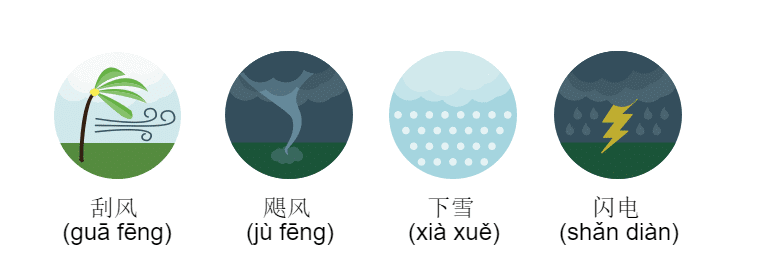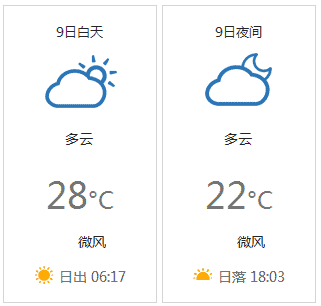British people (myself being one) are known for their love of complaining about the weather. In winter it’s too cold, in summer it’s too hot (you may laugh), if it rains it’s too wet, when it doesn’t it’s too dry. In China, it is much the same; a downpour can produce a gaggle of 阿姨 (ā yí) announcing “下雨了。” (xià yǔ le). Chinese ladies can often be found with an umbrella and is comparable with the British stereotype*. It’s great for rain, even better for sun!
*this is a lie; we always got caught in the rain, but without the pina colada.
If you’re going to chit chat with the locals, with friends or colleagues, you need to know a few weather words in order to complain. Or, if you’re sunning yourself in the ‘Chinese Hawaii’, Hainan, to compliment!
Weather Vocabulary
天气 (tiān qì) Weather
舒服 (shū fu) Comfortable
凉快 (liáng kuai) Cool
闷热 (mēn rè) Hot and humid
冷 (lěng) Cold
暖和 (nuǎn huo) Warm
热 (rè) Hot
多云 (duō yún) Cloudy
温和 (wēn hé) Mild
下雪 (xià xuě) Snowing
下雨 (xià yǔ) Raining
刮风 (guā fēng) Windy
晴天 (qíng tiān) Sunny day
阴天 (yīn tiān) Overcast
台风 (tái fēng) Typhoon
飓风 (jù fēng) Hurricane
雷声 (léi shēng) Thunder
闪电 (shǎn diàn) Lightning
暴风 (bào fēng) Storm

天气预报 (tiān qì yù) Weather forecast
暴雨 (bào yǔ) Rainstorm
降温 (jiàng wēn) To become cooler
升温 (shēng wēn) To heat up (temperature to rise)
阵雨 (zhèn yǔ) Rain shower
炎热 (yán rè) Boiling hot
寒冷 (hán lěng) Freezing cold
潮湿 (cháo shī) Humid (damp and moist)

干燥 (gān zào) Dry
湿润 (shī rùn) Moist
气候 (qì hòu) Climate
防晒 (fáng shài) sunscreen
雾 (wù) Fog
空气质量 (kōng qì zhì liàng) Air quality
结冰 (jié bīng) Icy/ to freeze
Seasons

季节 (jì jié) Season
春天/春季 (chūn tiān/chūn jì) Spring
夏天/夏季 (xià tiān/xià jì) Summer
秋天/秋季 (qiū tiān/qiū jì) Autumn/Fall
冬天/冬季 (dōng tiān/dōng jì) Winter
Discussing the Weather in Chinese
You can use the vocabulary from above to construct some simple sentences to discuss the weather in Chinese.
今天的天气很好。(jīn tiān de tiān qì hěn hǎo) Today’s weather is good.
昨天很闷热。(zuó tiān hěn mēn rè) Yesterday was hot and humid.
今天多云。 (jīn tiān duō yún) Today is cloudy.
昨天的天气很舒服。(zuó tiān de tiān qì hěn shū fu) Yesterday’s weather was very comfortable.
昨天很凉快/冷/热/暖和。(zuó tiān hěn liáng kuai/lěng/rè/nuǎn huo) Yesterday’s weather was very cool/cold/hot/warm.
下雨了。(xià yǔ le) It’s raining.
下雪了。(xià xuě le) It’s snowing.
刮风了。(guā fēng le) It’s windy.
天气预报说今天会有暴雨,你还是别出门了。(tiān qì yùbào shuō jīn tiān huì yǒu
bào yǔ, nǐ hái shì bié chū mén le)
The weather forecast said there will be rainstorm today, you’d better stay at home.
昆明的气候怡人,四季如春。(kūn míng de qì hòu yí rén, sì jì rú chūn.)
The climate of Kunming is very pleasant, it’s like spring all year round.
Asking about the Weather
When we ask ‘how?’ something is, we can use 怎么样 (zěn me yàng). You can also use the same phrase at the end of a sentence to ask about the weather.
这儿的天气怎么样?(zhèr de tiān qì zěn me yàng) What is the weather like here?
这儿的天气很好。 不冷也不热。(zhèr de tiān qì hěn hǎo. bù lěng yě bù rè) The weather here is very pleasant, it’s neither too cold nor too hot.
今年这儿的天气怎么样?(jīn nián zhèr de tiān qì zěn me yàng) What’s the weather been like here this year?
今年这儿的天气不太正常。(jīn nián zhèr de tiān qì bù tài zhèng cháng) The weather here was not normal this year.
深圳夏天的气候怎么样?(shēn zhèn xià tiān de qì hòu zěn me yàng) What’s the climate like in Shenzhen during summer?
深圳夏天的气候非常闷热。(shēn zhèn xià tiān de qì hòu fēi cháng mēn rè) The climate in Shenzhen during summer is very hot and humid.
Temperature
温度 (wēn dù) Temperature
度 (dù) Degree
零下 (líng xià) Below zero
华氏 (huá shì) Fahrenheit
摄氏 (shè shì) Celsius
最高气温 (zuì gāo qì wēn) maximum temperature
最低气温 (zuì dī qì wēn) minimum temperature
When describing the temperature we most often use the verb 是 (shì), meaning ‘to be’.
今天的温度是二十度。 (jīn tiān de wēn dù shì èr shí dù) The temperature is 20 degrees.
今天温度多少度? (jīn tiān de wēn dù duō shao dù) What’s today’s temperature?
However, if the adverb 差不多 (chà bu duō), which means ‘more or less’ is used, the verb 有 (yǒu), meaning ‘to have’ can be used.
天气预报说今天的温度差不多有三十度。(tiān qì yù bào shuō jīn tiān de wēn dù chà bu duō yǒu sān shí dù.) The weather report says today’s temperature will be around 30 degrees.
你说的是华氏还是摄氏?(nǐ shuō de shì huá shì hái shì shè shì) Do you mean Fahrenheit or centigrade?
在中国我们用的是摄氏。(zài zhōng guó wǒ men yòng de shì shè shì) We use centigrade in China.
摄氏三十度是华氏多少度? (shè shì sān shí dù shì huá shì duō shao dù) Thirty degrees centigrade is how many degrees in Fahrenheit?
差不多是华氏九十度。(chà bu duō shì huá shì jiǔ shí dù) It’s about 90 degrees Fahrenheit.
今天很冷,零下五度。(jīn tiān hěn lěng, líng xià wǔ dù) It’s really cold today, 5 degrees below zero.
Exercise
Look at the weather forecast below, and describe the weather in Shenzhen using the vocabulary and sentences you have learned above.
You can post your answers in the comment section below and we will check it for you.
Consider the following:
- the general weather
- the high and low temperature
- The air quality

